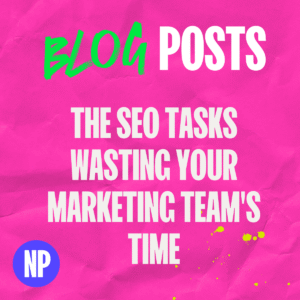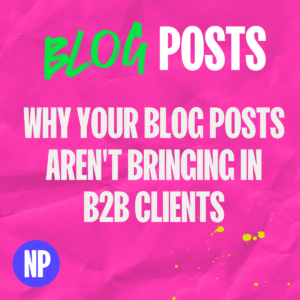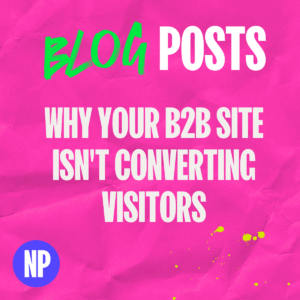(This is the 22/07/2025 issue of my newsletter – subscribe here)
Hey hey!
It’s been a week, right?
The June Google update is over, but my advice remains the same – hold tight until things settle down (there’s still a lot of volatility in SERPs, which means rankings are still fluctuating).
I started to write a blog post about confirmation bias, but it turned into a bit of a rant about arseholes talking bollocks, with a slight mention of confirmation bias at the end – I don’t really know what to do with it as it’s too long for a LinkedIn post and I don’t think I want it as a blog post, so it’s down below for you, you lucky, lucky reader.
And Roger Montti just published a piece about backlinks for Search Engine Journal that made me want to do a singing, dancing, screaming “I fucking told you so!” victory lap, and I don’t care how wild that makes me sound. More on that later.
What you’ll find inside
1 | How to spot bollocks from actual expertise
2 | Your free LinkedIn content tip that actually works
3 | Why link obsession is yesterday’s SEO strategy
4 | Why your copywriter won’t touch your project without a proper brief
The “well that’s utter bollocks” post without a home
If you regularly pop into LinkedIn, Twitter (never X), Bluesky, Threads, Instagram, Substack, Medium, or even your local pub, you’ll already know that there’s a ridiculously scary amount of people talking absolute, mind numbing bollocks out there. (I mention a lot of places, but let’s be honest, LI is the worst for it).
- That viral CEO statement apologising for his Coldplay concert embarrassment? Complete bollocks. Made up by a parody account and shared by thousands who assumed it was real.
- That bloke at your local who insists he knows someone who knows someone whose mate’s cousin won £50,000 on a scratch card using a “secret system”? Complete bollocks. He’s been telling the same story for three years, and mysteriously can never introduce you to this mathematical genius.
- Those “Generative Engine Optimisation experts” flooding LinkedIn with their revolutionary AI search strategies? Complete bollocks. GEO doesn’t exist – they’re just rebranding normal SEO and charging premium rates for made-up expertise.
It’s legit scary out there. AI is shitting out convincing-looking content faster than anyone can fact-check it. People are busier than ever, scrolling through feeds during coffee breaks, and the bullshit is getting more sophisticated. When you’ve got thirty seconds between meetings to check LinkedIn, how are you supposed to verify whether that “amazing” marketing strategy is legitimate or just another hustlebro (or sis) con?
Let’s be honest, for all you know, I could be doing exactly the same thing – talking complete rubbish across my social media and just waiting to reel you in*.
So how do you separate real expertise from absolute bollocks?
Honestly, I don’t have all the answers – I wish I did. But here are some tips I think might help.
🔵 Look for specifics, not generics. Real experts give you actionable advice with examples. Fraudsters speak in vague platitudes that could apply to anything.
🔵 Check their consistency over time. Have they been saying the same fundamental things for years, or do they jump on every new trend? Real expertise doesn’t change with every algorithm update or popular hashtag/meme.
🔵 See if they can explain their reasoning. Genuine experts understand why their methods work and can break down complex topics simply. Charlatans hide behind jargon and claim their methods are “proprietary.”
🔵 Watch how they handle criticism. Real experts engage with legitimate questions and criticism. Fake ones block anyone who challenges them or deflect with personal attacks.
Confirmation bias is real
The Andy Byron fake statement fooled thousands because people wanted to believe it was real. The same thing happens with business advice – we share things that confirm what we already think without checking if they’re actually true.
Next time you see advice that sounds too good to be true or an expert making wild claims, ask yourself: would I believe this if I saw it on a random blog instead of LinkedIn? And yes, that includes everything I write too.
Your business deserves better than social media nonsense. Trust your gut, verify claims, and remember – if someone’s real expertise was as impressive as their follower count suggests, they probably wouldn’t need to beg for likes every day.
*I’m not
Your free SEO tip – use LinkedIn articles
Stop letting perfectly good content sit on your website gathering dust.
If you don’t have time for proper content repurposing, here’s the lazy person’s version: copy and paste your best blog articles straight into LinkedIn articles, then link back to your website – bonus points if you use proper SEO-focused anchor text.
Not “click here” or “read more” – use phrases that actually describe what you’re linking to. Takes five minutes, gets your content in front of more eyeballs, lots of LI articles appear in search engine results, counts as a backlink if you care about that (see below), and hopefully sends quality traffic back to your site.
The article I’ll be sending to everyone asking about links
Finally got my go-to response for when people ask “what’s your backlink strategy?”
Roger Montti’s latest piece perfectly explains what some of us have been banging on about for years – links aren’t the magic bullet they once were.
So next time someone insists you can’t ‘do’ SEO without a “robust link building campaign,” I’ll just send them this article and save myself the time explaining why backlinks aren’t the be all and end all of SEO some people think they are anymore.
Why SEO copywriters demand those briefs
My latest blog post tackles the “Why do I need to fill in a brief – just start writing!” client complaint.
Because asking a copywriter to work without a brief is asking a chef to cook your favourite meal without telling them what you like to eat.
That brief isn’t bureaucratic nonsense – it’s the difference between generic “we’re passionate about excellence” drivel and copy that actually converts.
No brief? The worst outcome isn’t terrible copy. It’s copy that’s technically correct but completely forgettable. And who wants to end up with expensive mediocrity?
What am I working on this week?
SEO for an industrial flooring company that’s already getting leads from Google, Bing, and AI search (despite me not offering “GEO”),
Website SEO copywriting for my auction client – this week it’s fascinating pieces about military memorabilia, including medals, uniforms, and historical documents.
Plus I’m finishing up the AI search lessons for my non-wanky SEO courses. All current members will get this new content free as part of their lifetime access – because that’s how we roll when you’re not being charged monthly subscription fees for basic updates.
Need help with any of the above? You know where to find me.
That’s it for now,
Always non-wanky
Nikki
P.S. Give that LinkedIn content tip a try and let me know how you get on – it’s amazing how many businesses have brilliant blog content that never sees daylight beyond their website. Five minutes of copy-pasting could double your content’s reach, help your SEO (I said links weren’t the be all and end all, not that they couldn’t help), and give you some easy LI content when you’re staring at a blank screen.







